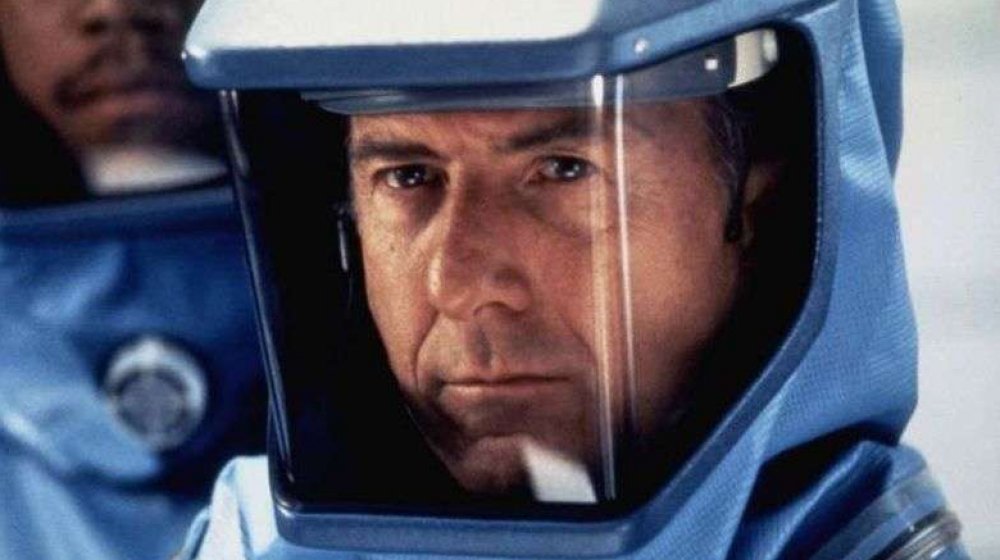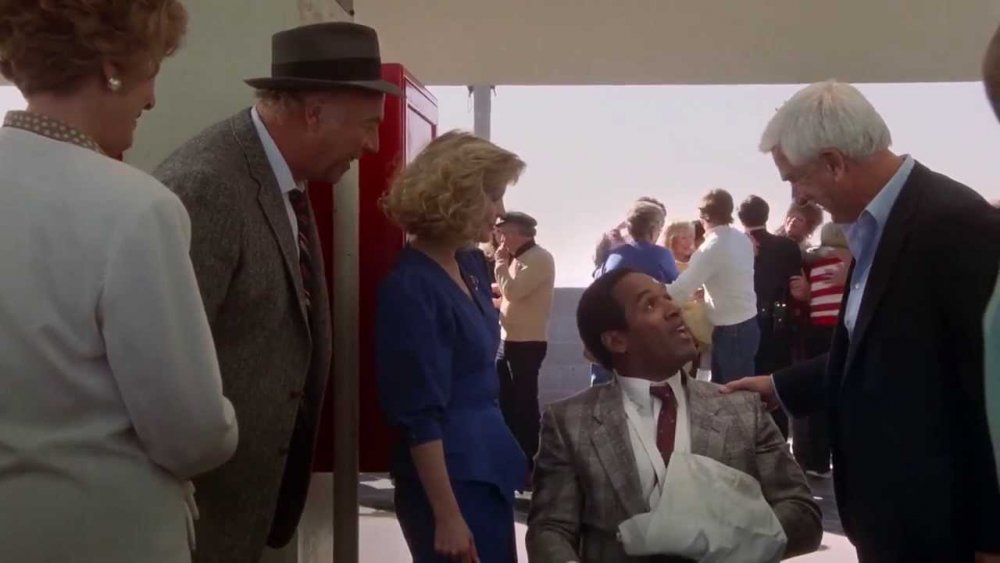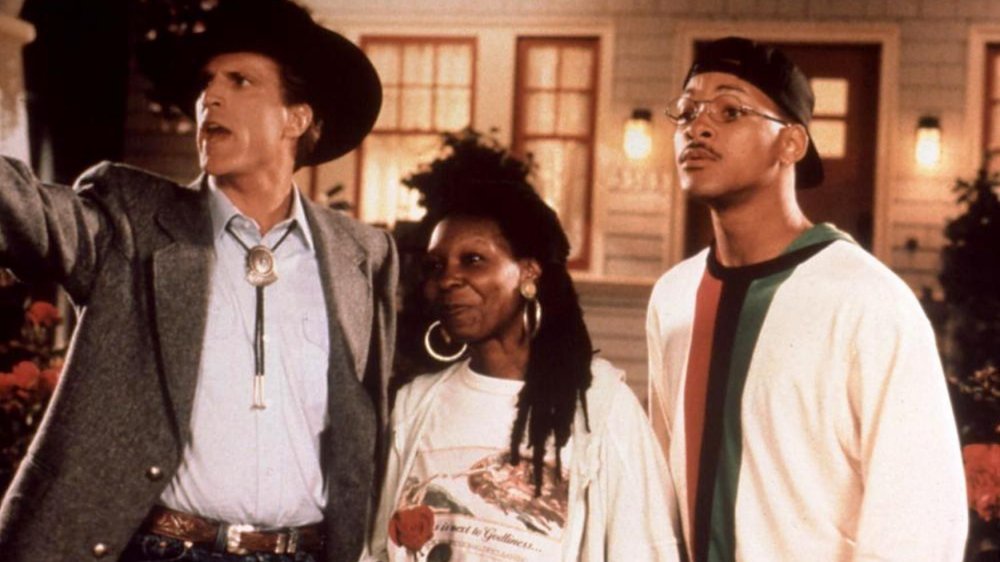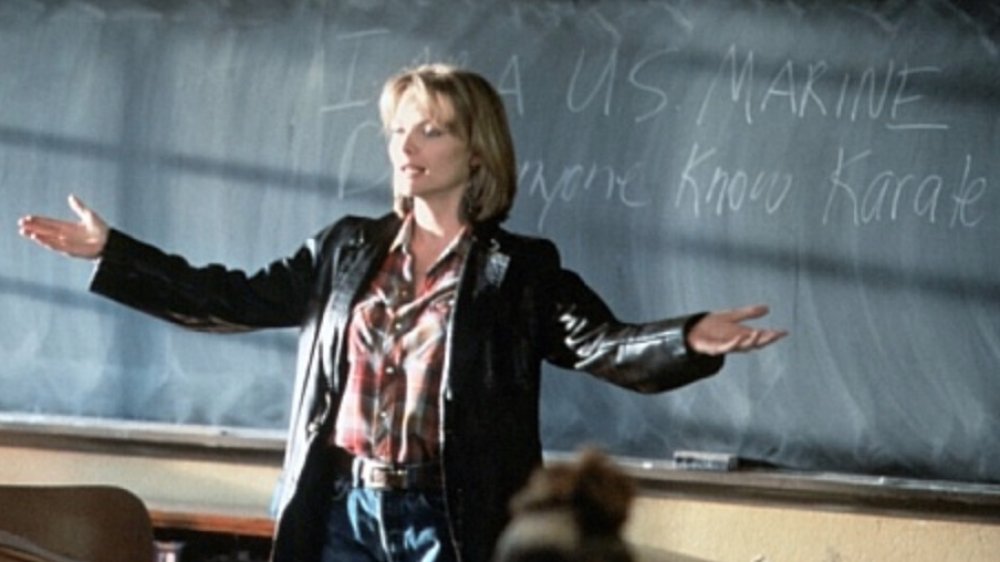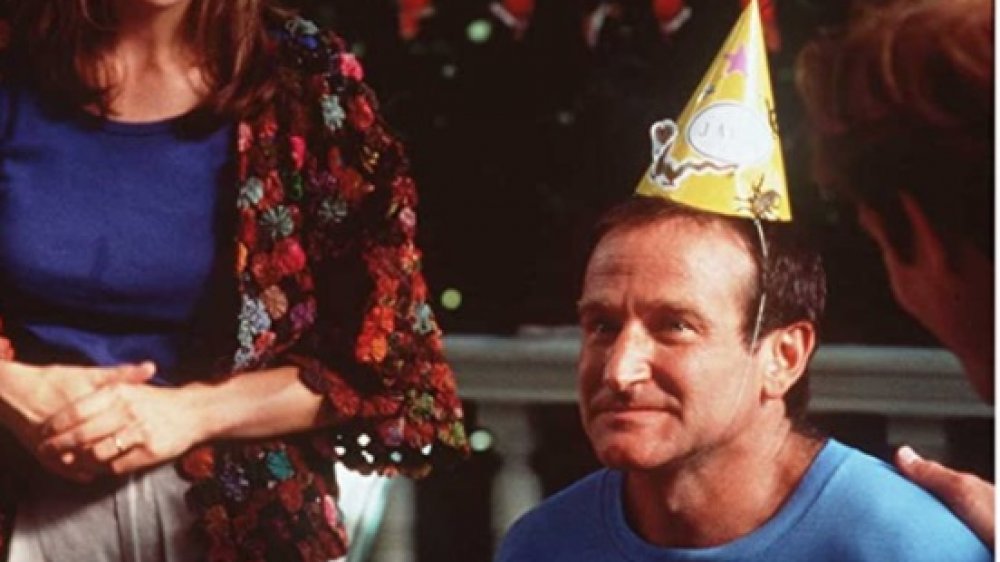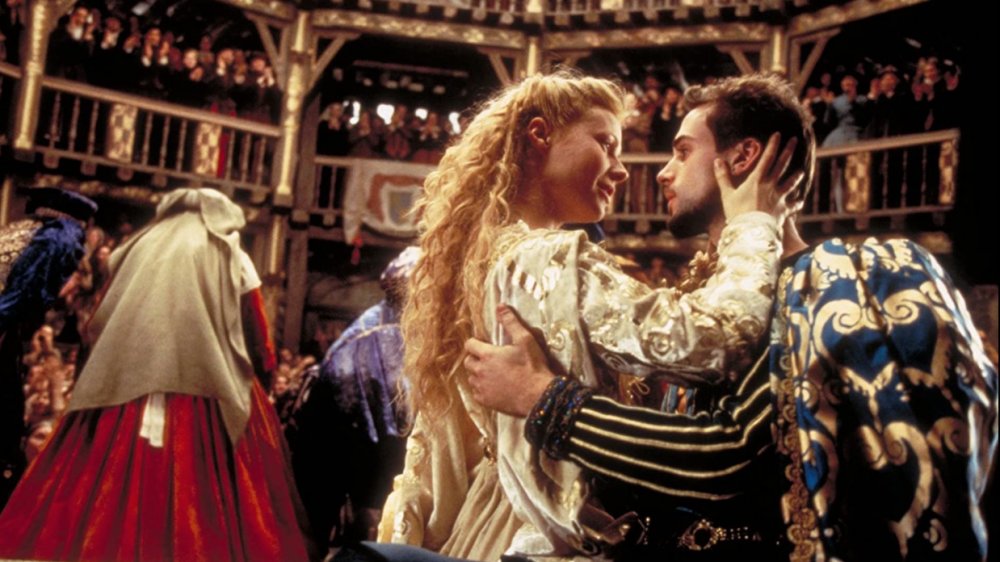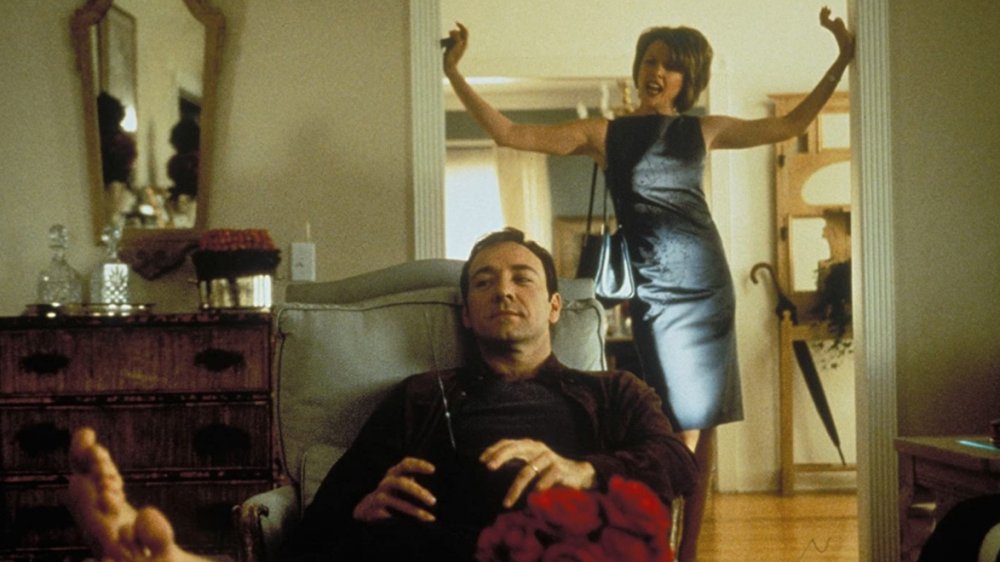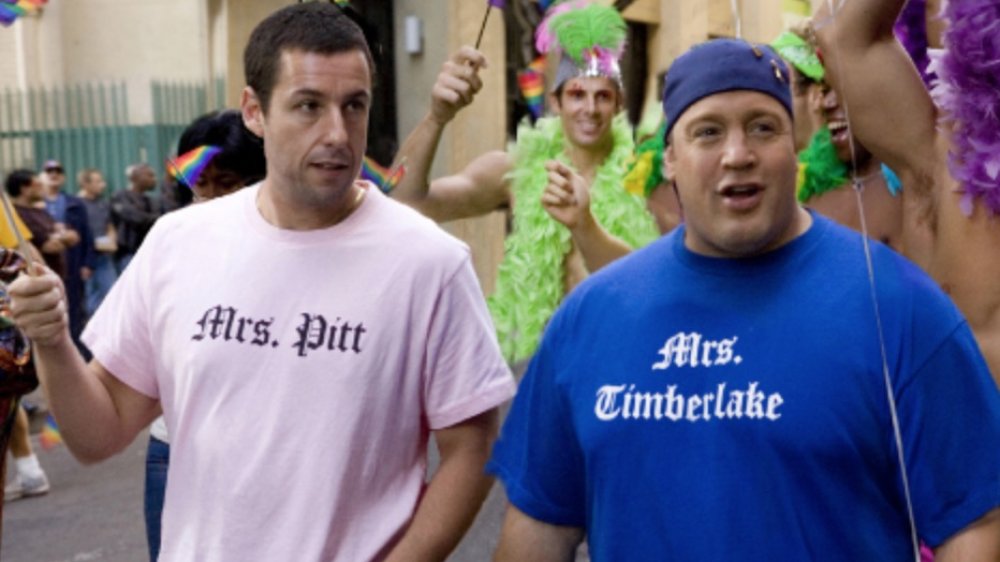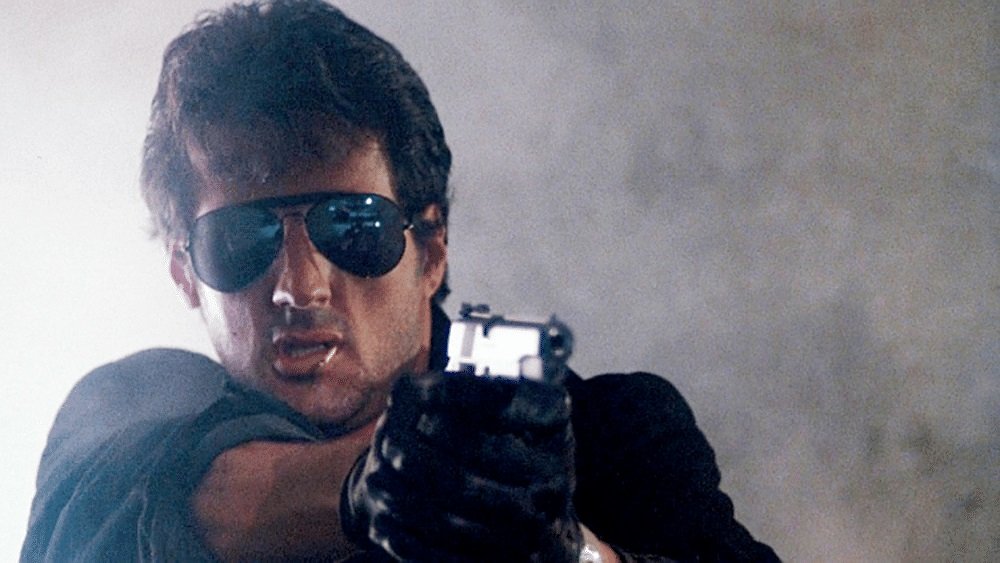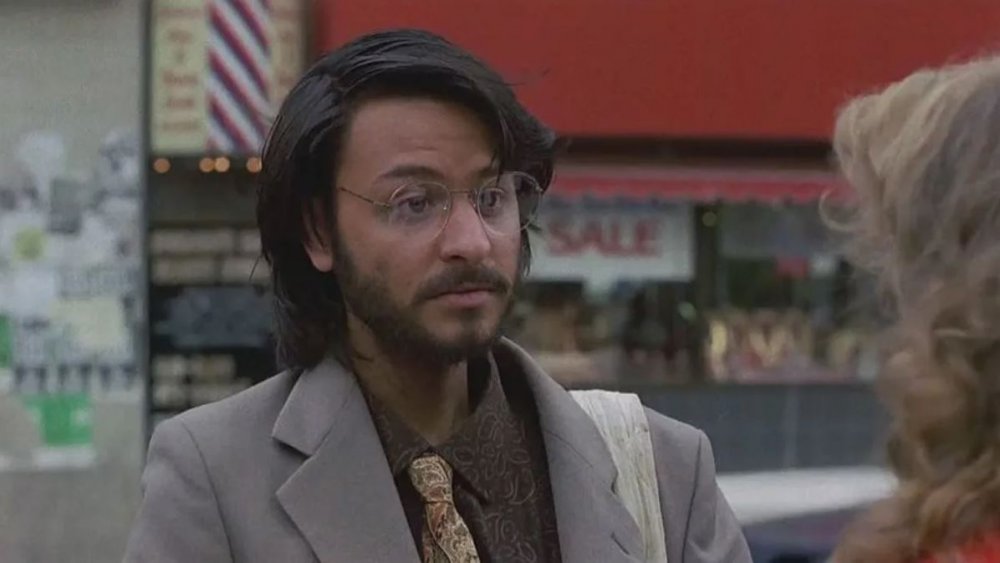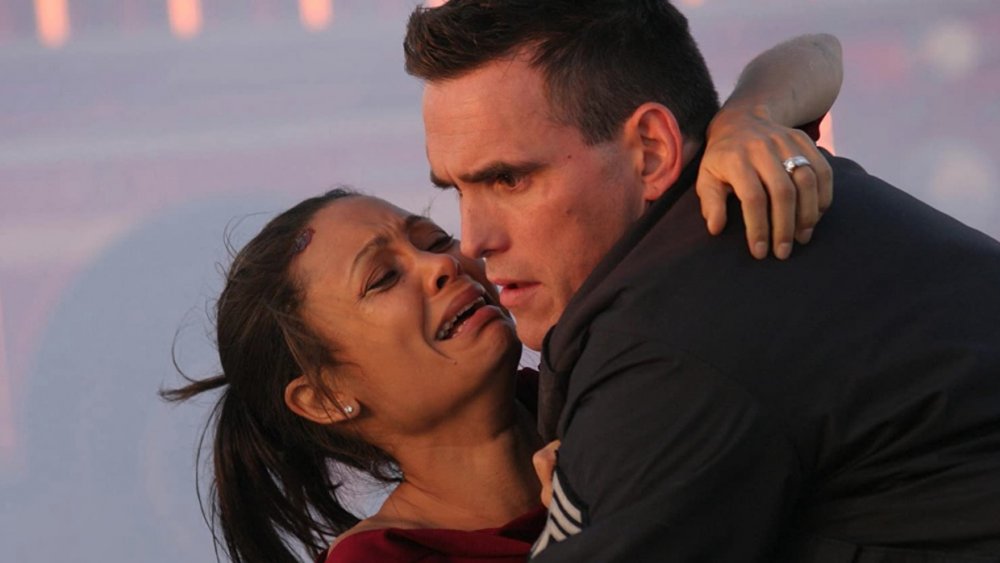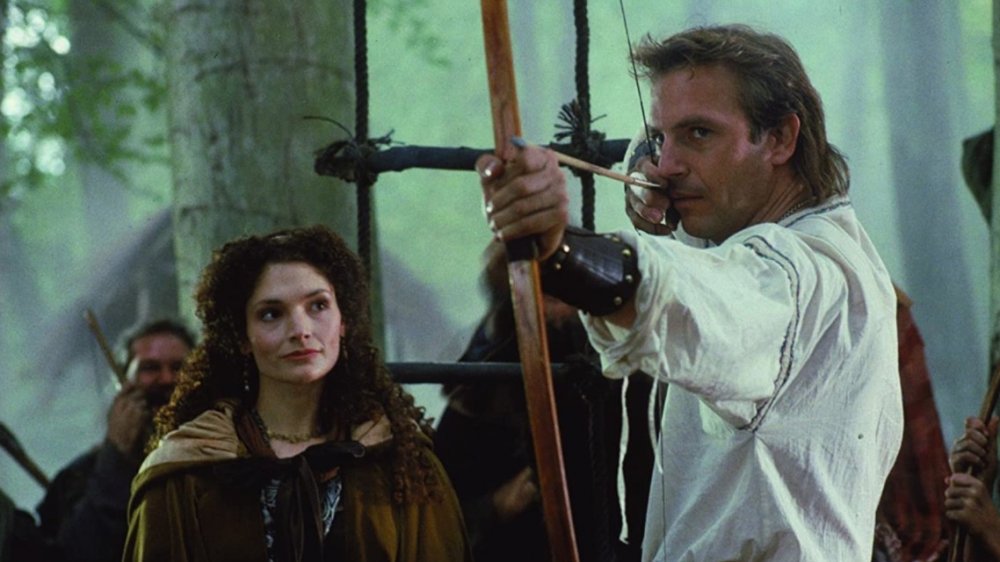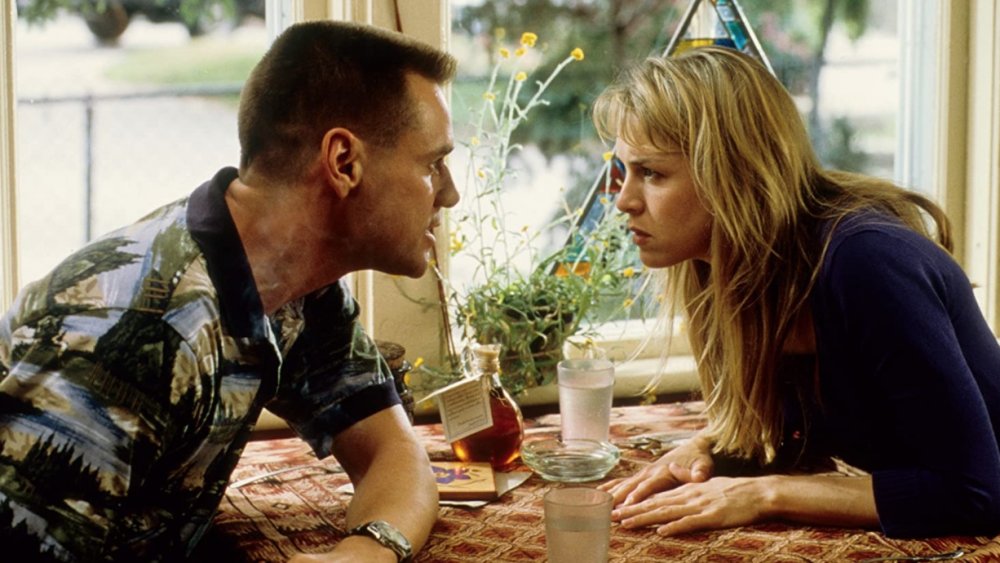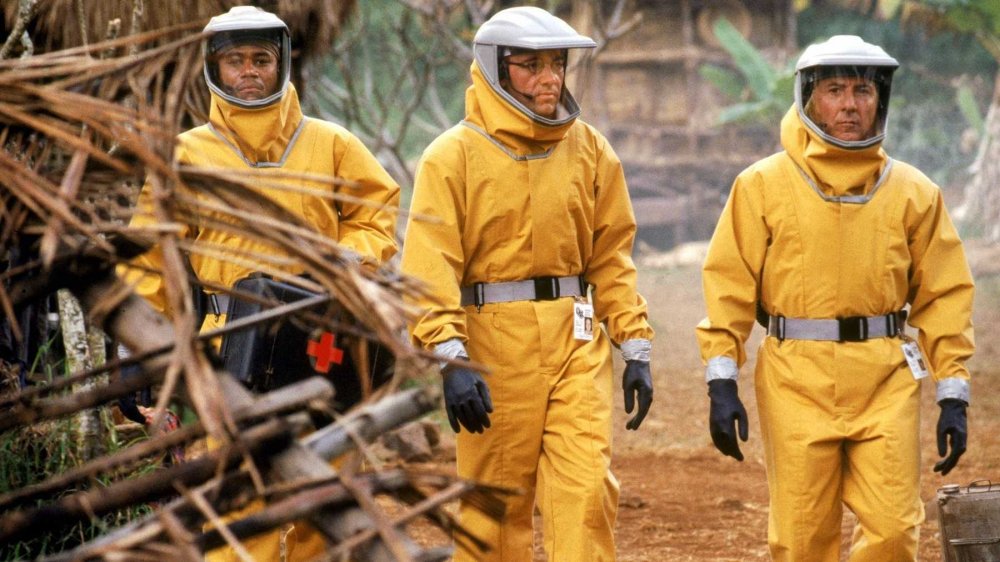Popular Movies That Aged Terribly
Movies are not like fine wine — they don't always improve with age. Sure, some of them do, and these are the ones that routinely pop up on the "Greatest Films Ever" lists from such prestigious organizations like the American Film Institute or Sight & Sound. But for each movie that has actually gotten better with every trip the Earth has taken around the sun, there are literally thousands more that make us cringe worse than drinking a glass of ten-year-old boxed wine.
Seriously, these movies have not aged well. At all. And with each passing year, their quality dissipates, leaving us to scratch our heads and wonder, "People actually enjoyed that? Really? That?" Many of the popular movies that have aged terribly were, let's be honest, bad at the time, and they're even worse today. Others have aged terribly because they portray stereotypes that were for some reason perfectly acceptable a few decades ago, while some films are simply the innocent victims of their cast member's making poor life choices. Ready to cringe? Here are popular movies that have aged terribly!
The Naked Gun aged terribly thanks to a clown who became a killer
How dare we pick on The Naked Gun? We feel pretty terrible about it, too. Along with the other Zucker, Abrahams, and Zucker spoof-movie masterpiece Airplane!, The Naked Gun is one of the few flicks we can quote from beginning to end and still laugh like idiots every time we see it, even if it's for the 1,237th time. The Naked Gun franchise was also super popular, bringing in more than $216 million worldwide on a combined budget of less than $75 million, making the former B-movie actor Leslie Nielsen, who was in his 60s at the time the franchise was filmed, one of the most unlikely box office draws ever.
So why is it on this list? You can probably guess: Orenthal James Simpson. The Juice. Better known to history as "O.J. Simpson," the former football star became a national treasure playing running back for the USC Trojans in college and then the Buffalo Bills and San Francisco 49ers in the NFL (he was even inducted into the Hall of Fame in 1985). With his football career over, Simpson moved onto movies, and his most successful role was playing against type as the graceless, doofus Nordberg in The Naked Gun. Oh, if only his legacy stayed there. Alas, Simpson got himself into trouble, you might've heard about it, and suffice it to say, it makes watching him in a silly comedy really uncomfortable. Maybe we'll just fast-forward the O.J. parts?
Ham-handed racial comedies are Made in America
Ted Danson was the star of Cheers, one of the most beloved sitcoms ever, and he also starred in 1987's top-grossing film, Three Men and a Baby. Whoopi Goldberg was one of the biggest comedians in the 1980s, and she won an Oscar for her role in the second-highest grossing movie of 1990, Ghost. What could possibly go wrong with pairing these two up? Well, the answer to that question is Made in America. In the film, Goldberg plays a free-spirited intellectual whose adult daughter discovers that her father was actually a sperm donor, and if that wasn't bad enough, he's white! Because ... comedy? Not only that, the father, played by Ted Danson, is a rootin'-tootin', cowboy boot-and-hat-wearing, loudmouth, self-promoting car salesman.
Critics weren't impressed (it currently has a rotten 31 percent Tomatometer rating), but audiences were more kind, and Made in America earned $44 million domestically and $104 million worldwide. Made in America was also a staple of basic cable for years, so if you didn't catch it in theaters, you may remember watching it from your couch. The film's heart is in the right place, but its ham-handed, change-of-heart narrative about the wacky adventures of black and white people makes Made in America feel made for TV. It was already dated in 1993 and looks worse today, especially following Danson's blackface, minstrel routine at a roast of Whoopi, who he began dating during filming. However, we can appreciate it for being one of Will Smith's first films.
Dangerous Minds has a shallow heart
As far as we're concerned, Michelle Pfeiffer can do no wrong. Or at least we would've said that before 1995, when she starred in one of her biggest solo hits, Dangerous Minds, which also happens to be a movie that hasn't stood the test of time. In the film, Pfeiffer plays LouAnne Johnson, a nine-year Marine veteran who moves into a different kind of war zone, an inner-city school in Los Angeles where she goes to teach "rejects from hell," Latino and African American students with severe social problems. Even if you haven't seen it, you can see where this is going.
While things start off rocky for LouAnne, eventually she's able to reach her students, though it takes some candy bar bribery and karate kicking to do it. It's your typical white savior narrative that we've seen a million times before in Westerns like Dances with Wolves, only this time the movie trades the tall cowboy for a diminutive teacher and Native Americans with inner-city minorities. While based on the real LouAnne Johnson's memoir My Posse Don't Do Homework, Dangerous Minds is riddled with so many tired stereotypes that its good intentions go up in a haze of crack smoke (because this is the 'hood, remember?). Critics hated it, but audiences made it a hit, as Dangerous Minds earned $84 million domestically and $179 million worldwide. Time has not been kind to Dangerous Minds, though Coolio's Stevie Wonder-riff Gangsta's Paradise is memorable.
Jack is a childish take on a real syndrome
Werner Syndrome is a rare disorder that results in the appearance of premature aging. Or, as the 1996 film Jack imagines this real-life condition, a ten-year old kid would look like a full-grown, 45-year old Robin Williams. Ugh. Does this sound like a Farrelly brothers comedy that's horribly insensitive and that we hate ourselves for laughing at? Oh, if only. Jack was directed by Francis Ford Coppola, the multiple Oscar-winning director of literally some of the greatest films of all time, and the film aims for greatness. Alas, Coppola's filmography now reads The Godfather, The Godfather Part II, The Conversation, Apocalypse Now ... and Jack. Watching this film today, you can't help but wonder, "How could so many talented people do something so absurd?" What were they thinking?
Well, they were most likely thinking about Oscar glory, as Williams probably thought this was his Forrest Gump (crossed with Big), while Coppola was hoping for a comeback after nearly two decades of creative misfires. Admittedly, if you need an actor who can play a child stuck in a grown man's body but do it with pathos and grace, you're not going to do better than Robin Williams. Unfortunately, nothing about this movie works, including Williams' performance, as the movie screams its message, whatever it is, with all of the subtlety of a toddler throwing a tantrum. Critics saw right through the schmaltz, and just like the character of Jack Powell, this movie has not aged well.
Shakespeare in Love shouldn't have won Best Picture
The 71st annual Academy Awards ceremony in 1999 featured Saving Private Ryan and The Thin Red Line, two of the greatest war movies ever made, nominated for Best Picture. However, it gave the Oscar to Shakespeare in Love. We'll give you a second until your eyes are done rolling into the back of your head. Sure, Shakespeare In Love has a magnificent 92 percent Tomatometer score from critics and earned $100 million domestically and $289 million worldwide ... but to say it's better than one of Steven Spielberg's best movies? Really? Groan.
While Shakespeare in Love is a perfectly entertaining and witty little romantic comedy, it's tough to watch with a straight face and not because you're laughing. We've seen much better costume dramas before and since (another one was even nominated for Best Picture that year, Elizabeth), and after more than two decades since its release, we can safely say Shakespeare in Love doesn't belong in any "best ever" category. But Shakespeare in Love's real cringe factor is the reason it won Best Picture. You might've heard of one of the film's producers, Harvey Weinstein. Weinstein's Miramax took home the gold for this film (and numerous others) thanks to his shameless Oscar campaigning that included pandering, threats, and bullying. So yeah, Weinstein was always a monster, no matter what he was doing.
American Beauty now looks downright ugly
In 1999, many moviegoers watched in shocked disbelief as a creepy teenager filmed a wind-swept grocery bag as if it were something deeply profound, and they thought to themselves, "Boy, this movie is pretentious and boring." These moviegoers were promptly shamed as philistines who "just didn't get it," as the echo chamber surrounding American Beauty's supposed greatness had already taken root like a rose bush. Now more than two decades later, we can safely say that yes, the trash bag was unintentionally apropos, as American Beauty is art-house garbage.
Following a wave of critical fawning, American Beauty won Best Picture at the 72nd annual Academy Awards, beating the far more deserving pictures The Green Mile, The Sixth Sense, and The Insider. American Beauty also earned $130 million domestically and $356 million worldwide, though we can only assume that half of those moviegoers thought they were seeing American Pie. But the film has not only aged poorly due to the fact it's, y'know, not good. There's also the creep factor. In the film, Kevin Spacey plays a depressed suburban dad who lusts after his teenage daughter's schoolmate. Granted, the character's lusting after an underage teen was meant to be creepy at the time, but today it's unwatchable given that, well, Spacey was accused of preying on an underage teen in real life. So to all of you forced to sit through American Beauty while wondering what the heck you were watching, you have been vindicated.
I Now Pronounce that this movie has aged terribly
Whether it's elder abuse in nursing homes, fractured families due to divorce, or even the eternal battle Heaven and Hell, you can always count on Adam Sandler to tackle important issues with his trademark subtlety and grace. Case in point, 2007's I Now Pronounce You Chuck and Larry, produced by Sandler's frat house film production company Happy Madison Productions. In one of Sandler's worst films, the comedian plays a carefree, non-committal, womanizing NYFD firefighter who helps out his friend and fellow firefighter, played by Kevin James, by marrying him. Wait, what? Yep, turns out that due to some make-believe law concocted by the film's plot, James' character must be married in order to get life insurance for his kids. Hey, what are friends for, right?
Hilarity supposedly ensues as the two straight dudes have to pretend to be gay in order to convince a skeptical bureaucrat they're together. Okay, then. As you might expect, I Now Pronounce You Chuck and Larry was massacred by critics with a brutal 14 percent Tomatometer rating. However, thanks to Sandler's critic-proof reputation, it made $120 million domestically and $187 million worldwide, making back its $85 million budget by a nose. However, the film's inept attempts at humor built around tasteless stereotypes means that most moviegoers have since filed for divorce from I Now Pronounce You Chuck and Larry. Remember kids, it's okay if your movie plays homophobia for laughs, as long as your characters learn a lesson in the end!
Cobra was popular in the '80s but totally bites today
Sylvester Stallone punching bad guys and blowing stuff up usually makes for a good (and profitable) time at the movies. At no time was this more true than in the 1980s, in which Stallone's gun-toting, fist-throwing machismo somehow ended the Cold War and won the Vietnam War. Not bad for a guy who tried to sell his dog to pay rent just ten years before. But in this flurry of carnage and chaos, Cobra stands out ... and for all the wrong reasons.
In the film, Stallone plays Lieutenant Marion "Cobra" Cobretti, a renegade cop who uses a personal arsenal that would make Frank "The Punisher" Castle blush in order to protect a model from a serial killer cult. The fact the model is played by Stallone's then-wife Brigitte Nielsen only lends to Cobra's self-indulgence, which is less a movie and more a Stallone vanity project. We're not saying shoot-em-ups should be subtle or thought-provoking, but there's a difference between Arnie cracking one-liners as an one-man Austrian army and the unfettered fetishism on display in Cobra. Basically, if Larry Flynt went into action movies instead of porno, you'd get Cobra.
Critics KO'd the action flick with a 14 percent Tomatometer rating, but its $49 million gross was enough to land it in the top 15 for 1986. Frankly, its staggeringly violent view of law enforcement makes what should be a fun popcorn movie painful to watch.
This popular sci-fi flick features a white guy in brownface
Steven Spielberg's massively successful E.T. the Extra Terrestrial inspired a wave of movies with adorable creatures. One of the better ones was Short Circuit, a film that's innocuous and inoffensive except for one glaringly bizarre casting decision. The film is about a robot named Johnny Five who was built as a weapon of war, but he really just wants to dance and crack jokes. Short Circuit and its sequel, the not-so-cleverly titled Short Circuit 2, are movies you probably caught on TBS as a kid. And if you haven't seen it since the first grade, then you have probably forgotten the character of Ben Jabituya, a cliched Indian scientist who helped engineer Johnny Five.
As far as crude stereotypes go, Ben isn't the worst, considering he's a gentle genius who becomes a fully fleshed out character in Short Circuit 2. There's just one minor problem. He's played by a white actor in brownface. Fisher Stevens played Ben, and the dude is not and never has been of Indian heritage. So we have to wonder ... why? Casting Stevens as an Indian is every bit as bad as white dudes playing Native Americans in countless Westerns, only in 1986, you'd have thought filmmakers knew better. Could they not find an Indian actor? If not, why did the character have to be Indian? It's a major miscast that makes an otherwise sweet, if forgettable, family film uncomfortable to watch.
We're still scratching our heads over Crash
You can't have a list about overrated movies that have aged terribly without Crash, right? Crash arrived in the spring of 2005 — riding on the waves of solid reviews, its stacked cast's star power, and most especially, Oprah Winfrey's glowing endorsement — to a $54 million domestic and $98 million worldwide gross on a $6.5 million budget. Had Crash stayed in its lane, it might be more fondly remembered, but something funny happened on the way to the Oscars. Crash did the improbable and got nominated for Best Picture, then did what some thought was impossible and beat surefire Oscar frontrunner Brokeback Mountain to take home the Academy's top prize.
Theories abound about how this happened. Were homophobic Oscar voters uncomfortable with awarding a movie about two male lovers? Or was Crash, a film about privileged Los Angelenos suffering from "white guilt," simply more appealing to solipsistic Hollywood types? No one dares argue that Crash was better than Brokeback Mountain because, c'mon. To be fair, Crash isn't as horrible as you've been led to believe. That said, it's still a preachy, saccharine treatise that condemns LA's culture of self-absorption while ironically and obliviously being super impressed with itself at the same time. Basically, it's everything that irritates us about LA shoved into 113 minutes. Its "let's all get along" moralizing from pampered celebrities was a pretty tired message then, and it's downright exhausting to sit through now.
Robin Hood robbed us of our precious time
Kevin Costner should fire his agent. He's an A-list actor who chronically makes poor choices. For every financially successful, critically acclaimed hit that promises to turn his career around, he follows it up with something dreadful. Case in point, Robin Hood: Prince of Thieves. Despite a mediocre 51 percent Tomatometer score, Robin Hood: Prince of Thieves earned $165 million domestically and $390 million worldwide, becoming the second highest-grossing movie of 1991, ahead of even Silence of the Lambs and Beauty and the Beast. Yet while those movies (and the year's number one hit, Terminator 2: Judgment Day) have stood the test of time, Robin Hood: Prince of Thieves has largely been forgotten.
So how did it do so well at the box office? Oh right, Robin Hood: Prince of Thieves came out just a few months after Kevin Costner's Dances with Wolves dominated the Oscars and the box office. Timing is everything in Hollywood, and in the 1990s, Kevin Costner could do no wrong ... until he decided doing Waterworld in 1995 and The Postman in 1997 was a good idea, but that's another story. With a comfortable distance of more than 30 years, we can safely say Robin Hood: Prince of Thieves should thank its lucky stars it came out so soon after Dances with Wolves, otherwise Kevin Costner's big-budget follow-up would have flopped harder than his attempt at an English accent.
This Jim Carrey comedy plays split personalities for laughs
Jim Carrey was breathing rarefied air in the 1990s, as he was practically his own movie genre. Hollywood made comedies, action movies, dramas, and Jim Carrey movies, and most of the time, the latter was the most successful at the box office. Carrey was feeling invincible, and like most highly successful comedians eventually do, he wanted to be taken seriously as an actor. But after his string of three dramas in a row — The Truman Show, Simon Birch, and Man on the Moon — proved his formidable box office prowess was mostly limited to making people laugh, Carrey returned to the warm embrace of comedy with his Dumb & Dumber directors, the Farrelly brothers, in Me, Myself & Irene.
In this raunchy summer 2000 comedy, Carrey played a meek, nice guy, small-town cop with dissociative identity disorder who snaps into a borderline psychopathic alternate personality, and these two personalities compete for a woman's affections. Critics didn't care for it, but mostly because it was the same-old, same-old from Carrey, which was fine with moviegoers, who gave Me, Myself & Irene a $90 million domestic and $149 million worldwide gross. But let's be real here — Me, Myself & Irene is a comedy that plays a real mental disorder for laughs. Having a split personality isn't side-splitting, it's freaking terrifying! It's a tired old comedy trope that needs to retire.
Outbreak has aged terribly thanks to real-life events
Outbreak was a popular, if forgettable, 1995 action thriller that spent 25 years making the rounds on TNT before 2020 came along and real-life events blasted it to Netflix's top ten. These days, the film about a vicious pandemic that brave doctors struggle to contain seems eerily prescient. Make no mistake though, Outbreak is a cheap Michael Crichton knockoff that has aged terribly now that most of the world's population has experienced what living in a pandemic is really like.
The filmmakers wanted Harrison Ford to star, which makes sense, as Outbreak feels like it takes place in the same universe as Air Force One (both were directed by Wolfgang Petersen). It fancies itself a "thinking man's thriller," but it really just wants to blow stuff up, and with Ford starring, that totally works. But with Hoffman, a brilliant actor who doesn't wear the action star suit comfortably, the film feels forced. Knowing what we know now and living through what we've lived through, you can't help but roll your eyes as Hoffman's Action Man Doctor® steals a combat helicopter from the military to fly up and down the California coast to catch a monkey, whose blood easily cures an airborne virus that miraculously has been confined to one town. For a planet sheltering at home because a virus spread globally in just two months and with a real vaccine taking months to create, Outbreak's action-movie bombast seems woefully out of touch.
